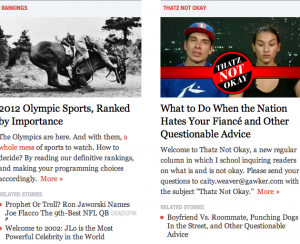Brands
3 Lessons Bloggers Can Learn from Gawker’s Bold Moves
This post is part of the Branded Blogging Series, which features tips on how to learn from the successes of some of the most innovative and successful brand blogs.
 Gawker Media is one of the most successful blogging outlets on the Internet. In February of this year, one year after the site’s infamous redesign, owner Nick Denton reported readership had increased by 10 million monthly visitors over the year before.
Gawker Media is one of the most successful blogging outlets on the Internet. In February of this year, one year after the site’s infamous redesign, owner Nick Denton reported readership had increased by 10 million monthly visitors over the year before.
By late spring of 2012, Gawker had reached, on average, 19 million viewers every month, according to the Columbia Journalism Review, and it’s one of the top 10 blogs on the web, according to Technorati.
Provide a mix of original and trending content
Gawker posts about what’s hot on Tumblr, Reddit, various blogs, and in traditional media, such as the New York Times. But it has also shifted to posting more original news stories and scoops.
“Gawker blogs once consisted almost entirely of remixes of other organizations’ news — with an added dash of commentary or knee-jerk snark,” wrote Denton on the site’s LifeHacker blog in November 2010. “One law of media competition applies as strongly to web properties as it did to their predecessors: Scoops drive audience growth.”
Denton continued, “We learned our lesson: Aggressive news-mongering trumps satirical blogging.”
 The Gawker founder admits that his site sometimes pursues “gutter journalism,” such as revealing pictures of a young Christine O’Donnell partying, but such posts drive up numbers.
The Gawker founder admits that his site sometimes pursues “gutter journalism,” such as revealing pictures of a young Christine O’Donnell partying, but such posts drive up numbers.
Denton says his priority is real news: “We believe that the best Web content optimization strategy is something as old as journalism itself: the shocking truth and the authentic opinion.”
Branded blogs can follow these same guidelines. While keeping their finger on the latest trending stories, they should also seek out their own scoops. Gawker maintains a mix of both.
Promote user discussion via comment sections
Gawker’s comments section is a prominent part of their website. The comments that pass the standards test show up on the articles, and users can engage in active discussion, sometimes creating dozens of different threads.
 The section, adopted in part by the New York Times, allows users to reply to one another, post favorite comments to Facebook and Twitter, and builds a trusting relationship with the best commenters, so they don’t have to be vetted before posting.
The section, adopted in part by the New York Times, allows users to reply to one another, post favorite comments to Facebook and Twitter, and builds a trusting relationship with the best commenters, so they don’t have to be vetted before posting.
New York Magazine quoted Denton in 2007 saying, “Gawker comments, long an embarrassment, frankly, now represent one of the strongest aspects of the site. … They reintroduce an element of anarchy, which was in danger of otherwise being lost, as the site became more professional. I want secrets to be exposed, memos leaked, spy photos published, arguments to fly.”
Along with encouraging commenters to join in the discussion of a news item, Gawker’s emphasis on comments can help the site track the popularity of posts. By creating a hierarchy within the section, novice users will be inclined to work harder to get more recognition, while the experts with the highest ratings will feel empowered.
By emphasizing the importance of comments, branded blogs can embolden readers and keep them coming back.
Using performance-based payment for writers
Paying writers in part or fully based upon how many hits their articles receive is a controversial tactic used by Denton. However, this is commonplace among blogs. While Denton argues that Gawker writers are encouraged to write original content and “linkworthy” posts, Scott Karp of Publishing 2.0 says that there is a potential downside.
Sure, he says, writers may strive for the most interesting posts and investigate scoops, but most will probably just link to whatever is most popular on Reddit, Pinterest, or Twitter to drive the numbers up. Karp argues this will lead writers to fixate on SEO, using certain keywords and tags in their posts to rank high on search engines.
Gawker stands out among its competitors in many ways: It gets “sensational” scoops that do well with its audience, it encourages commenters and discussion, and forces writers to take SEO and analytics into consideration.
Denton has provoked more than his fair share of backlash, but he’s created one of the most frequented sites on the Internet, one which offers telling lessons for any prospective web entrepreneur or brand blogger.
Image by FlickrGet better at your job right now.
Read our monthly newsletter to master content marketing. It’s made for marketers, creators, and everyone in between.




